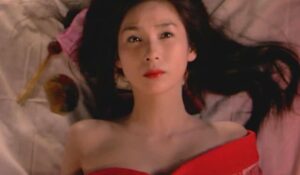Sada is a story of love, lust, jealousy, anger, betrayal, and revenge, and there are a number of very emotional scenes to experience, especially when it comes to Sada’s relationship with her husband and children.
Sada’s story is an interesting one, not because of any particular twists or turns in the narrative, which are fairly routine, but because of the fact that the audience is able to follow every step of the way and witness the events in great detail, thanks to the attention-grabbing camera angles and a very good script.
The performances are solid, but the true star of the show is the director, Nobuhiko Ôbayashi, whose visual style is absolutely stunning. It’s easy to see why Sai has won so many awards and accolades for his work.
Sada Movie Review
Director: Nobuhiko Ôbayashi
Writer: Yûko Nishizawa
Stars: Hitomi Kuroki, Tsurutarô Kataoka, Norihei Miki

Sada Abe was a Japanese woman who, in 1936, murdered her lover, Yuki Mori, for what she considered his infidelity. The story then becomes quite complicated because Sada’s husband and family were also involved in her crime. She was initially arrested and convicted of murder but was later released when a journalist discovered that Sada had already confessed to the crime while under the influence of a strong drink and drugs.
The interesting thing about Sada is how she was perceived by others and how she herself perceived herself. Sada, a housewife who was married to a man who had become increasingly unhappy with her, killed Mori because he was cheating on her. This is when the situation became very complicated as Sada’s husband, who she told everything about, then killed her lover, as well as the judge who sentenced her. What was the motive for the murders? Was it jealousy? Did she really kill him because he cheated on her? Was it really an affair, or was it something else? All these questions are asked throughout the film.
Director, Noboru Iguchi, is one of Japan’s best and I was very surprised to see him direct this. It’s not a typical crime movie, it’s a psychological thriller, which I thought was a nice choice to make. I know that I’m a bit of a drama fan, but I’m also a crime movie fan. So, I was pleased to see that the director made a choice to go with something that I’m not used to seeing.
In terms of acting, this film really showcases the skill of the lead actor, Sada. She has to portray such a tragic and shocking story, and at the same time, she has to do that in such a light-hearted, playful way. I think that she’s done a great job.
The cinematography is fantastic. Everything is shot in black and white, and it gives the film a nostalgic, old-fashioned feeling. The music is perfect, as well. It all just fits together.
The story is not really that simple though, as I said before. The story is about how Sada’s husband and family felt about her. It’s about how they reacted when she confessed to killing the man. It’s about how she felt about herself.
There are a couple of very dramatic moments, but they aren’t really what I would consider ‘harrowing,’ although I did find them quite interesting and moving. If you’re looking for something truly harrowing, this isn’t it, although there are a few sequences where Sada’s feelings come into full force and one scene that could be described as being very painful to watch.
Sada’s love for her husband and children is touching and very believable. I was also pleased to see that the script gives due consideration to the fact that Japanese law at the time allowed husbands to divorce their wives, and that Sada, having been married for several years before she became involved with Yamaoka, had two young children to look after.
There are a few other minor points, such as Sada’s mother-in-law and her father-in-law, who are both played by very talented actors, and I liked the way the script dealt with the fact that Yamaoka and Sada were both in a very stressful situation and the impact that this had on their relationship.
A little bit of a problem with the script is that Sada, who is very much a strong character, is only briefly in the show, although she plays a large role in the outcome of the story.
This movie has a lot of controversy around it because many people say that Sada Abe did not commit this crime. They say that this was a man who took advantage of Sada Abe and raped her, then killed her.
But when I first saw this movie, I thought, “Whoa, this is really amazing!” I just didn’t think it was real. And the more I watched, the more I was like, “What are you talking about?!” The man did rape her, but they used a knife and that is why it was a fatal attack.
Then the woman was tried and acquitted by a Japanese court, and the man was convicted. He went to jail and served seven years in prison. Then he was pardoned. This is because, according to the rules of Japanese justice, he could not be tried for the rape because she was not in the country when the crime took place.
In the end, it is the law, not the facts, that matter.
Conclusion:
In my opinion, this fascination is mainly due to the fact that this woman is a woman who committed a very serious crime and the fact that she did it for love, a crime that has very low acceptability in Japan. It is a crime that we associate with ‘Western’ countries where love is considered evil and only reserved for the ‘other’.
Sada Abe is a very interesting character, a woman with a very good and positive personality, who has a strong will and determination. It is a very attractive character and I think that it is very important to study her and how the Japanese people perceive her. Also check our latest post-No Smoking
